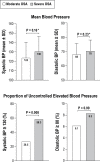Association of severe obstructive sleep apnea and elevated blood pressure despite antihypertensive medication use
- PMID: 25126027
- PMCID: PMC4106935
- DOI: 10.5664/jcsm.3946
Association of severe obstructive sleep apnea and elevated blood pressure despite antihypertensive medication use
Abstract
Rationale: We hypothesized that untreated severe obstructive sleep apnea (OSA) is associated with elevated ambulatory blood pressure (BP) in subjects with high cardiovascular disease (CVD) risk despite medical management.
Methods: Data from the baseline examination of the Heart Biomarker Evaluation in Apnea Treatment (HeartBEAT) study, a 4-site randomized controlled trial were analyzed. Individuals with moderate-severe OSA (apnea hypopnea index, AHI = 15-50) and cardiovascular risk were recruited from cardiology practices. Those with hypertension were included. Intensive antihypertensive regimen (IAR) was defined as ≥ 3 antihypertensives including a diuretic. Definitions were: controlled BP (BP < 130/80), uncontrolled elevated BP (BP ≥ 130/80 not on IAR) and resistant elevated BP (BP ≥ 130/80 mm Hg despite IAR). Associations of untreated severe OSA (AHI ≥ 30) and uncontrolled and resistant elevated BP were evaluated using logistic regression analyses adjusted for age, sex, race, body mass index, smoking status, diabetes, and CVD.
Results: Among the 284 participants (mean age 63.1 ± 7.2 years, 23.6% with severe OSA), 61.6% had controlled BP, 28.5% had uncontrolled elevated BP, and 9.9% had resistant elevated BP. Among participants prescribed IAR, resistant elevated BP was more prevalent in those with severe compared to moderate OSA (58.3% vs. 28.6%, p = 0.01). Participants with severe OSA had a 4-fold higher adjusted odds of resistant elevated BP (OR 4.1, 95% CI: 1.7-10.2), a finding not reproduced in the absence of IAR use.
Conclusions: Among patients with increased cardiovascular risk and moderate to severe OSA, untreated severe compared to moderate OSA was associated with elevated BP despite IAR suggesting untreated severe OSA contributes to poor BP control despite aggressive medication use.
Commentary: A commentary on this article appears in this issue on page 845.
Keywords: blood pressure; cardiovascular disease; sleep apnea.
Figures



Comment in
-
Resistant hypertension and untreated severe sleep apnea: slowly gaining insight.J Clin Sleep Med. 2014 Aug 15;10(8):845-6. doi: 10.5664/jcsm.3948. J Clin Sleep Med. 2014. PMID: 25126028 Free PMC article. No abstract available.
References
Publication types
MeSH terms
Substances
Grants and funding
LinkOut - more resources
Full Text Sources
Other Literature Sources
Medical

